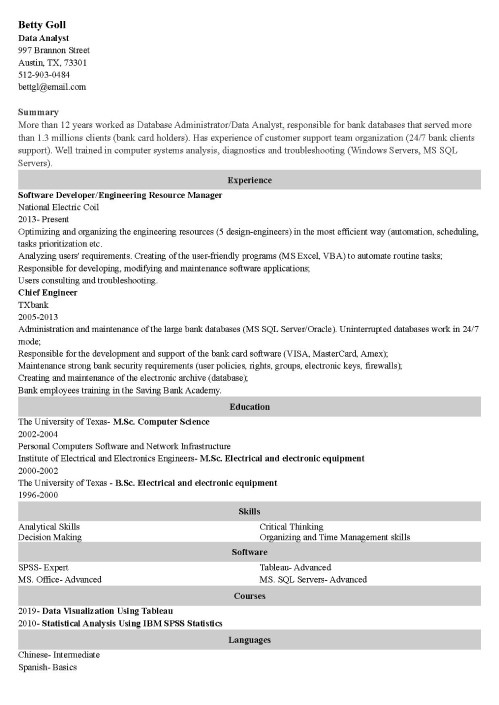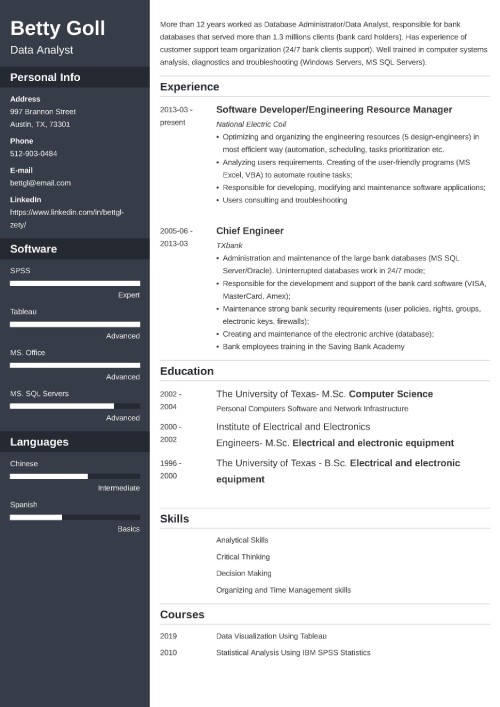
Conceptual Skills: Definition and 20+ Examples
There are certain things we take for granted. The idea behind a piece of paper with a $ sign on it having enough value to buy you a pizza is one of such things.
This is only possible because someone came up with the concept of money—a concept so appealing, it turned into a social contract spanning the entire humanity. That’s the power of conceptual skills, and you can harness it to give your resume a competitive edge.
This article will show you:
- The best definition of what conceptual skills are.
- Why such skills are important for leaders and managers.
- Examples of conceptual skills in management.
- A list of conceptual skills keywords for use on a resume.
Want to save time and have your resume ready in 5 minutes? Try our resume builder. It’s fast and easy to use. Plus, you’ll get ready-made content to add with one click. See 20+ resume templates and create your resume here.
Sample resume made with our builder—See more resume examples here.
Looking for information on other skills? Head straight to one of our guides:
- Organizational Skills
- Project Management Skills
- Marketing Skills
- Creative Thinking Skills
- Collaboration Skills
- Administrative Skills
1
Conceptual Skills—Definition
Conceptual skills are thinking skills which let you grasp complex ideas and come up with answers for difficult problems. These skills are valuable because they allow people to find many solutions for different challenges through deliberate thought and abstract reasoning.
For example, this type of skill might allow managers comprehend relations between different departments, link them to the functioning of the entire company, and optimize how these elements interact.
Thanks to such skills, they’re able to put the company itself in the bigger picture, plan its growth, see potential obstacles, and develop contingency plans on the basis of their concepts.
What does this mean in practice?
Just think about it—companies consist of different units and departments.
Sometimes the business goals of those units may be mutually exclusive (think of production and marketing departments, for example) and yet the whole company has one mission and vision. A crucial management task is to push the entire company in the same direction regardless of individual goals.
It’s the ability to think in abstract terms and construct meaningful concepts that makes all this possible.
The importance of conceptual skills grows together with the level of seniority.
A company will only grow if its top management sees the big picture, all its connotations, and implications.
That being said conceptual skills come in handy for each and every employee and team member.
Why?
If you can’t imagine how the tasks you do contribute to the functioning of the entire organization, you may quickly lose your motivation and eventually—
Become disengaged.
The idea of conceptual skills dates back to 1974 when psychologist Robert Katz named three basic managerial skills: technical, human, and conceptual.
Katz defined these skills in the following manner:
- Conceptual skills—the ability to work with abstract concepts and ideas.
- Human skills—the ability to communicate and cooperate with others. In other words, interpersonal skills.
- Technical skills—the skills necessary to get the job done, or hard skills.
Katz’s “trinity” played an important role in the development of the so-called skills approach to leadership, and further research into prioritizing managerial skills.
Want to learn more about listing all kinds of skills on a resume? See our guide 99 Key Skills for a Resume (Best List of Examples for All Types of Jobs)
2
Conceptual Skills—Examples
Here’s the thing—
Conceptual skills consist of several interrelated abilities. All of them are equally important but you wouldn’t call any single one of them a strictly conceptual skill.
That’s why they’re just like Captain Planet.
You can call them conceptual skills only if you combine all of them.
So, here’s your list of conceptual skills in management:
Conceptual Skills in Management
Analytical skills
Strong analytical skills are crucial when it comes to breaking complex issues into smaller components to see how they’re interconnected and to draw conclusions.
Critical thinking skills
You must be able to think rationally and approach issues critically. This way, you’ll be able to decide which ideas are trustworthy and which to reject. Critical thinking skills are crucial to finding optimal solutions.
Decision-making skills
Making the right decision may be a hard nut to crack. Especially, if you’re visualizing a hypothetical scenario. That’s exactly why strong problem-solving skills are part and parcel of managerial conceptual skills.
Creative thinking skills
The ability to approach a problem from a couple of different perspectives is vital if you’re bent on finding the best solution. Creative thinking skills are necessary for you to imagine all the angles from which to look at the issue at hand.
Communication skills
Your conceptual skills would amount to nothing if you weren’t able to let the world know about your ideas. This is why communication skills are such an important part of conceptual thinking.
Interpersonal skills
Going solo isn’t the best strategy to push an organization forward. If you wish to see your concepts made flesh, you will need to collaborate with others. And good interpersonal skills will help you a lot.
List of Conceptual Skills
For resume writing purposes, the following list of keywords may come in handy.
But—
Before you start using them, learn how to make the most of them from our guide Resume Keywords To Use: Step-by-Step Guide [25+ Examples & Tips]
- Abstract thinking
- Analytical skills
- Cognitive skills
- Communication
- Contextualizing
- Creative thinking
- Critical thinking
- Decision making
- Action planning
- Innovation
- Leadership skills
- Logical thinking
- Management skills
- Motivating
- Organizational skills
- Presenting
- Problem-solving
- Data mining
- Strategic planning
One more thing—
Conceptual skills are vital to both managers and leaders.
But not every manager can be considered a leader.
In his TED Talk, “Why Good Leaders Make You Feel Safe,” Simon Sinek identifies a good leader as someone who “want[s] to provide their people opportunity, education, discipline when necessary, build their self-confidence, give them the opportunity to try and fail, all so that they could achieve more than we could ever imagine for [them]selves.”
In contrast—
Sinek sees managers as people within organizations who get to a certain seniority level and have authority over others but don’t necessarily have leadership traits.
It would seem that strongly developed interpersonal and communication skills are what differentiates great leaders from managers.
When making a resume in our builder, drag & drop bullet points, skills, and auto-fill the boring stuff. Spell check? Check. Start building a professional resume template here for free.
When you’re done, Zety’s resume builder will score your resume and tell you exactly how to make it better.
3
Conceptual Skills—A Job Seeker’s Perspective
Listen:
As a job seeker, you’ll always want to put your best suit forward.
The problem is—
When it comes to conceptual skills it may be hard to pinpoint what exactly to highlight on a resume.
With our guides, you’ll learn how to show all your best skills on a resume.
Here’s a one to help you put your managerial skills in the limelight: Top 10 Management Skills: List & Great Advice (Not Just for Managers).
Not sure what the differences between soft and hard skills are, or how to make the best use of either on a resume? Head straight here: Soft Skills vs Hard Skills for a Job: What Employers Look for (+Lists).
Communication is arguably the most important skill in any kind of professional or personal setting. From our guide, you’ll learn all you need about effective communication: 20+ Effective Communication Skills for Resumes & Workplace Success.
And finally, here’s a guide that will show you how to draw the recruiter’s attention to your best skills on a resume: 99 Key Skills for a Resume (Best List of Examples for All Types of Jobs)
Worried about the job interview?
Worry no more.
Here’s a selection of guides that will help you breeze through any interview question:
- What Are You Passionate About? [Interview Question & Best Answers]
- What Motivates You? How to Best Answer the Tricky Interview Question
- 20 Situational Interview Questions and Answers to Nail Your Interview
- STAR Method for Acing Behavioral Interview Questions (25+ Examples)
Plus, a great cover letter that matches your resume will give you an advantage over other candidates. You can write it in our cover letter builder here. Here's what it may look like:
See more cover letter templates and start writing.
Key Takeaways
Here’s a quick summary of all you need to remember about conceptual skills:
- Thanks to conceptual skills you can visualize abstract concepts.
- Conceptual skills are an umbrella term for a skill set comprising analytical, creative thinking, and communication skills among others.
- They’re particularly important for leaders and managers.
- The higher up the company hierarchy, the more important conceptual skills become.
- You can use certain keywords on your resume to show the recruiter you have the relevant conceptual skills.
Do you have any questions about conceptual skills? Maybe you’d like to share some tips on how to develop them? Give us a shout out in the comments below! We’d love to hear from you!




